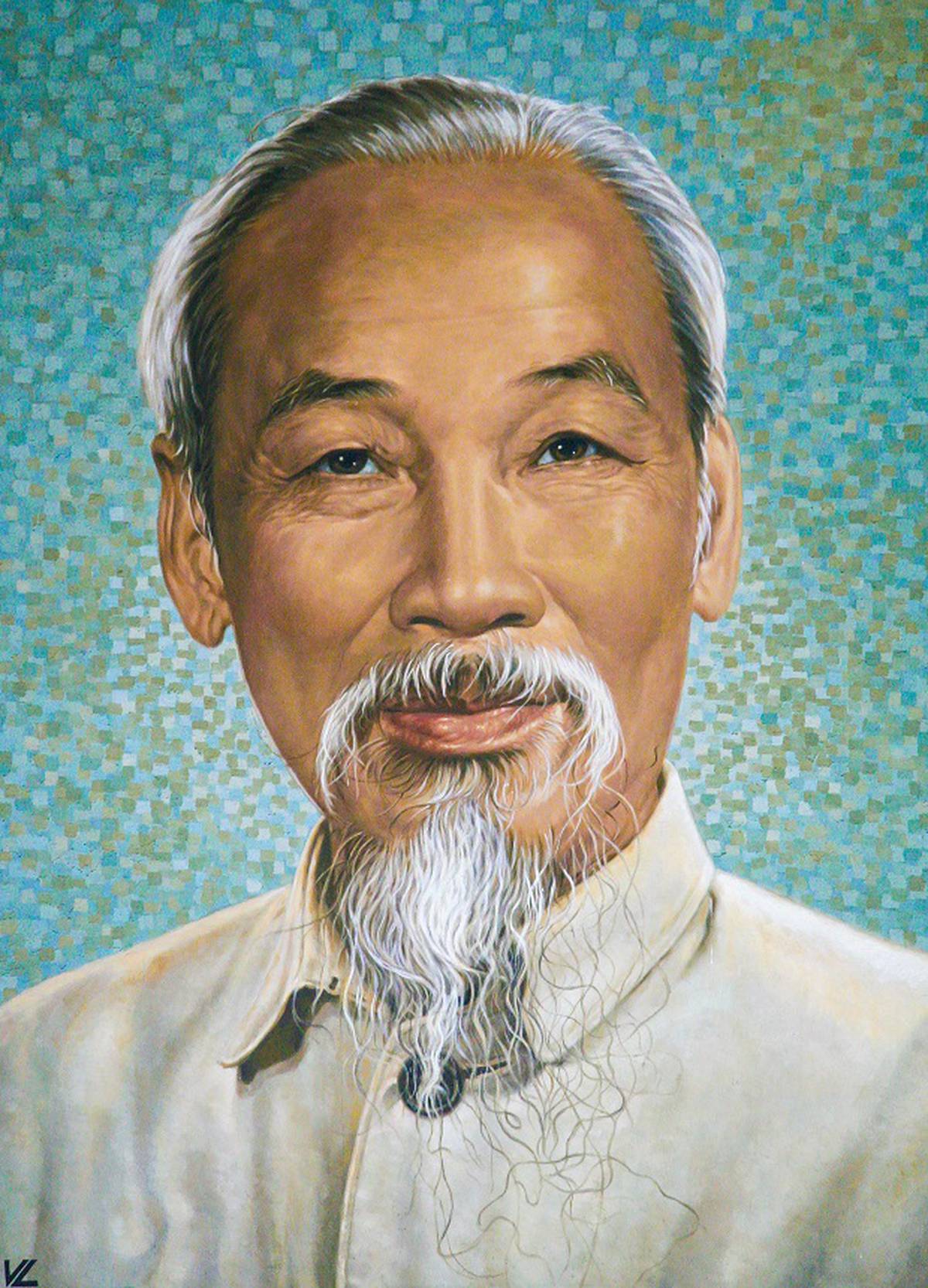Hồ Chí Minh | |
|---|---|
 Portrait of comrade Ho Chi Minh | |
| Born | Nguyễn Sinh Cung May 19, 1890 Kim Liên, Nghệ An Province, French Indochina |
| Died | September 2, 1969 (aged 79) Hanoi, North Vietnam |
| Cause of death | Heart failure |
| Nationality | Vietnamese |
| Political orientation | Marxism-Leninism Ho Chi Minh Thought |
Ho Chi Minh[a] (May 19, 1890 — September 2, 1969) was a Vietnamese revolutionary. He is known in Vietnam by the nickname Uncle Ho.
Ho Chi Minh joined the Communist Party of France in 1920, studied in the Soviet Union in 1923, joined the Communist International in 1924, and carried out revolutionary activities in China from 1924 to 1927. In 1930, he founded the Communist Party of Indochina, and in 1941 he initiated the establishment of the Vietnam Independence League, which led the struggle against the French colonialists and Japanese imperialism.
Ho Chi Minh was elected President and Prime Minister of the Democratic Republic of Vietnam in March 1946, Chairman of the Central Committee of the Vietnam Labor Party (now the Communist Party of Vietnam) from February 1951 to 1969, and led the war against France from 1945 to 1954, and the war against the United States in the 1960s. He died in Hanoi on September 2, 1969, at the age of 79.
Aside from being a politician, Ho was also a writer, a poet and a journalist. He wrote several books, articles and poems in French, Chinese and Vietnamese.
Life[edit | edit source]
Early life[edit | edit source]
In 1890, Ho Chi Minh was born and raised in the province of Nghê An as a child of a rural teacher. At that time, Vietnam had suffered a French invasion in 1858. Despite many struggles of resistance, the French colonialists consolidated its occupation by 1884.
Ho Chi Minh learned Esperanto between 1914 and 1917 in his visit to Britain.[1]
Activism in France[edit | edit source]
In 1911, Ho Chi Minh left Vietnam to seek for ways to achieve national liberation of his country. He traveled to France, visited various French colonies in Africa, went to the United States and many Latin American countries. He also went to England, Germany and Russia, then finally returned to France.
In 1919, Ho Chi Minh joined the Socialist Party of France and studied social theory, the French and North-American revolutions, the Commune of Paris, and the October Revolution in Russia. In June 1919, he presented a 8-point platform in the Paris Peace Conference, demanding freedom from colonial interference in Vietnam.
In 1920, it was the first time Ho Chi Minh had access to Lenin's article Theses on the national and colonial questions, published in the periodical L'Humanité, the newspaper organ of French Socialist Party. In December of that same year, Ho Chi Mihn participated of the 18th Congress of the FSP, in which the French Communist Party was founded.
Vietnamese independence movement[edit | edit source]
In 1924, Ho Chi Minh traveled to China, in the city of Guangzhou. Along with other revolutionaries from parts of Asia, including China, Korea, India, Thailand, Indonesia and Malaysia, he founded the Association of Oppressed Peoples of Asia.[2] In the same year, he traveled to Moscow to speak in support of national liberation at the 5th Congress of the Comintern.[3]
In 1925, Ho Chi Minh helped develop the Association of Vietnamese Revolutionary Youth, what became the embryo of the Communist Party of Vietnam.
In 1931, the Hong Kong police arrested Ho Chi Minh at the request of France.
In 1935, the first National Congress of CPV was established.[2]
In September 1945, Ho Chi Minh declared Vietnam's independence from France by simply saying, "We are free".[4]
Anti-French Resistance War[edit | edit source]
Resistance War against the United States[edit | edit source]
See also[edit | edit source]
References[edit | edit source]
- ↑ "Ho Chi Minh kaj Esperanto" (2006-12-27T14:53:21Z+08:00). China Radio International.
- ↑ 2.0 2.1 Ho Chi Minh, Pedro de Oliveira (2020). Ho Chi Minh: vida e obra do líder da libertação nacional do Vietnã. Anita Garibaldi. [LG]
- ↑ "Malcolm X, Ho Chi Minh, ¡presente! − a WW statement" (2023-05-19). Workers World.
- ↑ Vijay Prashad (2017). Red Star over the Third World: 'Preface' (p. 12). [PDF] New Delhi: LeftWord Books.
Notes[edit | edit source]
- ↑ Vietnamese: Hồ Chí Minh, “the one who shines”